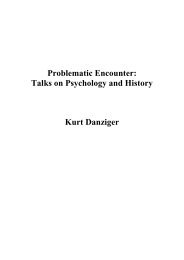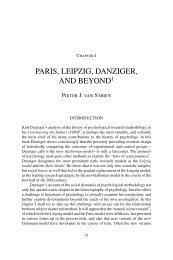The positivist repudiation of Wundt - Kurt Danziger
The positivist repudiation of Wundt - Kurt Danziger
The positivist repudiation of Wundt - Kurt Danziger
Create successful ePaper yourself
Turn your PDF publications into a flip-book with our unique Google optimized e-Paper software.
THE POSITIVIST REPUDIATION OF WUNDT<br />
titude was one which was given practical rather than elaborate theoretical expression, as<br />
in Ebbinghaus’s famous attempt to eliminate value and meaning in the form <strong>of</strong> the non-<br />
sense syllable. It was Titchener who eventually became rather explicit about the fun-<br />
damental shift in attitude that had taken place. He did this by introducing the category <strong>of</strong><br />
“existential experience,” which he considered to be characteristic <strong>of</strong> science.77 What he<br />
means by this is what is left <strong>of</strong> experience when purpose, value, social utility, in short,<br />
meaning, have all been removed. According to this metaphysic, there lies beyond the<br />
world <strong>of</strong> ordinary human experience another world <strong>of</strong> “sheer existence,” available to us<br />
through scientific observation which “pierces the overlay <strong>of</strong> interpretation” to reveal a<br />
world <strong>of</strong> “facts,” “a world scoured clean <strong>of</strong> belief and inference and all such evaluative<br />
accretion.” 78 <strong>Wundt</strong> would have regarded such a world as a product <strong>of</strong> an abstracting in-<br />
tellect, an instance <strong>of</strong> mediated experience which could not form the basis <strong>of</strong> psychology;<br />
for Titchener, it was the only legitimate world for the psychologist.<br />
Boring saw that the inescapable result <strong>of</strong> his teacher’s philosophy <strong>of</strong> science was a<br />
form <strong>of</strong> behaviorism. <strong>The</strong> basis <strong>of</strong> psychological science is not “actual experience” but<br />
“real experience” which is derived from the former by a process <strong>of</strong> inference or concep-<br />
tualization. Sensations are in fact “systematic constructs” which form the mediating<br />
categories that transform actual into real or scientific experience. Once Titchener had<br />
recognized that the world <strong>of</strong> “sheer existence” was an abstracted, constructed world, it<br />
really became impossible to continue to believe that the reality <strong>of</strong> the building blocks <strong>of</strong><br />
this world could be established by observation, introspective or otherwise. <strong>The</strong> only<br />
reality the elements <strong>of</strong> this world could lay claim to was a Machian, pragmatic reality.<br />
“<strong>The</strong> new logic asserts that sensations exist if the conception <strong>of</strong> their reality proves a<br />
fruitful hypothesis for a scientific psychology.” 79 But if the world <strong>of</strong> sensations is itself<br />
the result <strong>of</strong> reflection, then the rug is pulled out from under Titchenerian introspective<br />
psychology for which that world provides the foundation. “Both consciousness and un-<br />
consciousness are inferred,” states Boring,8o thus relegating consciousness to the status <strong>of</strong><br />
an intervening variable, which is exactly the position accorded to it in E. C. Tolman’s<br />
neobehaviorism.<br />
It is not only that the world <strong>of</strong> what Boring calls “the new psychology <strong>of</strong> content,” is<br />
an inferred world, it is also a world constructed in a certain image. “Historically science<br />
is physical science. Psychology, if it is to be a science, must be like physics . . . . <strong>The</strong> ul-<br />
timate abandonment <strong>of</strong> dualism leaves us the physical world as the only reality.” *l <strong>The</strong><br />
“consciousness” which appears as a term in this final version <strong>of</strong> Machian psychology has<br />
the same kind <strong>of</strong> relation to ordinary consciousness as the “intelligence” <strong>of</strong> intelligence<br />
testers has to the popular understanding <strong>of</strong> that term. <strong>The</strong>y are not the same thing at all.<br />
Boring’s “consciousness” is something that is completely defined in terms <strong>of</strong> a limited<br />
number <strong>of</strong> physical dimensions, such as extensity (ultimately measured in centimeters),<br />
protensity or duration (measured in seconds), intensity (measured in decibels, etc.), and<br />
finally, quality, measured along the dimensions traditionally used to study primary sen-<br />
sory discrimination. Physical science is explicitly used as a model in the construction <strong>of</strong><br />
these dimensions. <strong>The</strong>re is, <strong>of</strong> course, no room in this “consciousness” for the experience<br />
<strong>of</strong> meaning or value. “A complete knowledge <strong>of</strong> the psychology <strong>of</strong> sensory data would be<br />
an approximately complete knowledge <strong>of</strong> consciousness.” 82 Such matters as meaning<br />
and purpose clearly do not belong to this psychology <strong>of</strong> consciousness, and therefore they<br />
are relegated to the area <strong>of</strong> behavioral response. Titchener had legislated sensation to be<br />
devoid <strong>of</strong> meaning; meaning appeared by the addition <strong>of</strong> a “context.” But that addition,<br />
as Boring quite correctly concludes, is simply the response <strong>of</strong> the organism to the original<br />
223





